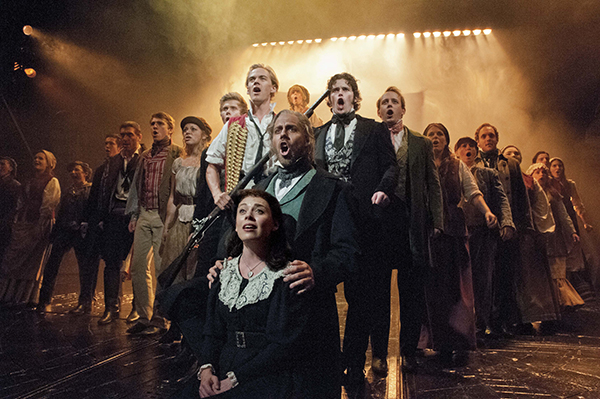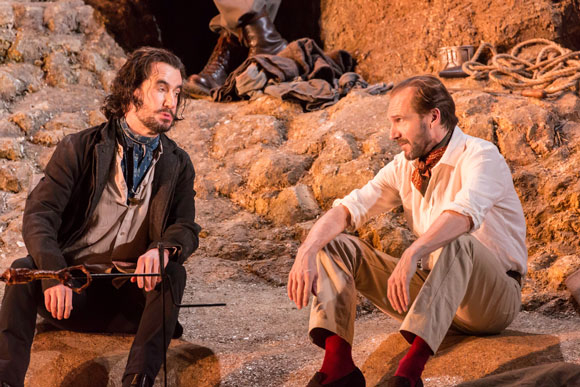Michael Coveney: Are books taking over the stage, and does it matter?
To mark World Book Day, our chief critic reflects on the influence of literature on contemporary theatre

© Michael Le Poer
That's three kids' books, an Irish novel and two French classics. Touring theatre is a mobile library, too, with big schedules planned for Simon Stephens' brilliant adaptation of Mark Haddon's The Curious Incident of the Dog in the Night-time and a new version of Cameron Mackintosh's production of Mary Poppins (which retrieved some of the "darker side" of P L Travers's eight magic nanny books). Gypsy, coming to the Savoy, is partly based on the memoirs of Gypsy Rose Lee and Wicked is totally based on Gregory Maguire's fictional re-telling of the Wizard of Oz story.
The most important ingredient for any great musical is the libretto, or book, which is why Jersey Boys, Sunny Afternoon, Mamma Mia! and Beautiful – all hugely enjoyable in their different and similar ways – are not great musicals and never will be. Cameron Mackintosh is the first to say that Les Misérables is a great musical thanks to Victor Hugo; it's also a great musical because of the theatrical vision of Trevor Nunn and John Caird, the directors. And the model for their production was their collaboration with David Edgar on a two-part, six-hours adaptation of Charles Dickens' Nicholas Nickleby for the RSC, something as vivacious and light on its feet as the more recent RSC literary blockbuster, Wolf Hall and Bring Up the Bodies (adapted from the virtually unreadable novels of Hilary Mantel), simply wasn't.
The RSC Nickleby, using a third person narrative as an organic ensemble tool, was heavily influenced by the 1970s productions by Mike Alfreds for Shared Experience, which included an inspired adaptation of a much tougher Dickens novel, Bleak House. A similar sort of shared narrative technique – and fragmentation of the characters – was used by Giles Havergal in his version of Graham Greene's Travels With My Aunt at the Glasgow Citizens, now a stock item in the national repertoire.
'Good novelists rarely progress to the theatre'
One or two critics – well, Michael Billington – think that only second-rate books make first-rate theatre. You can see the logic of this argument if you ever suffered stage versions of Jane Austen, for instance; without the controlling, witty narrative voice of Austen herself you end up with a hollow costume drama, all bonnets and crinolines. But the Russian theatre of the last century is almost entirely predicated on its great literature. And anyone who saw the brief visit of the Vakhtangkov Theatre of Moscow with Pushkin's Eugene Onegin to the Barbican will have seen that great literature and great theatre can be a combustible combination.
More than that. They express the soul of a nation. And we see little of that kind of theatre in London, though we did have the two brilliant productions of Dostoevsky novels by Yuri Lyubimov, The Possessed and Crime and Punishment. Both these books have been staged in the British theatre – someone said to me the other day that seeing the late Barrie Ingham play Stavrogin at the Mermaid in the Bernard Miles era turned him on to Russian literature for life – but "novels on stage" in the post-war theatre usually meant insipid chunks of dialogue from C P Snow (The Masters was one of the worst evenings of my life), J B Priestley (though Priestley, of course, was a fine dramatist in his own right), even Ivy Compton-Burnett (though she was a gilded stylist, and Julian Mitchell did a couple of good adaptations).

(© © Johan Persson, National Theatre)
Chekhov was renowned as an essayist and fiction writer long before he wrote plays, but good novelists rarely progress to the theatre. Bernard Shaw was a failed novelist, so he became a great dramatist instead, though the raging nay-sayers against the National's new Man and Superman (jaw-jaw Shaw bore, etcetera) probably wish those early novels hadn't been so vehemently rejected. The National's current books-into-plays – Behind the Beautiful Forevers and Treasure Island – follow the traditional path of skilled, experienced dramatist (David Hare and Bryony Lavery) adapting non-fiction reportage and family favourite.
When Orson Welles staged Herman Melville's great whale novel Moby Dick in the West End in 1955 Kenneth Tynan said it dwarfed anything seen in London since the Great Fire, suggesting half-mockingly that Welles might in the future be confined by such merely possible things as Proust or Tolstoy's War and Peace. Since when, War and Peace – especially in the magnificent Erwin Piscator version – has become another stock piece in the repertoire, though not recently (too expensive); and the whole of Proust, incredibly, was written as a screenplay by Harold Pinter before it was staged at the National.
I like the Pinter script, but the best Proust was at the Citizens in the early 1980s, the whole thing telescoped into three-and-a-half hours and insouciantly titled A Waste of Time. This was the work of the late Robert David MacDonald, who is one of only two contemporary dramatists to translate Chekhov directly from the Russian (the other is Michael Frayn). David MacDonald thought that the bigger and better the book, the less the translation of it to the stage mattered, though he added a cautionary note: "The people I admire most (apart from Dickens) are Jane Austen and Thomas Mann, but they defy treatment in the theatre and I would never do them."












